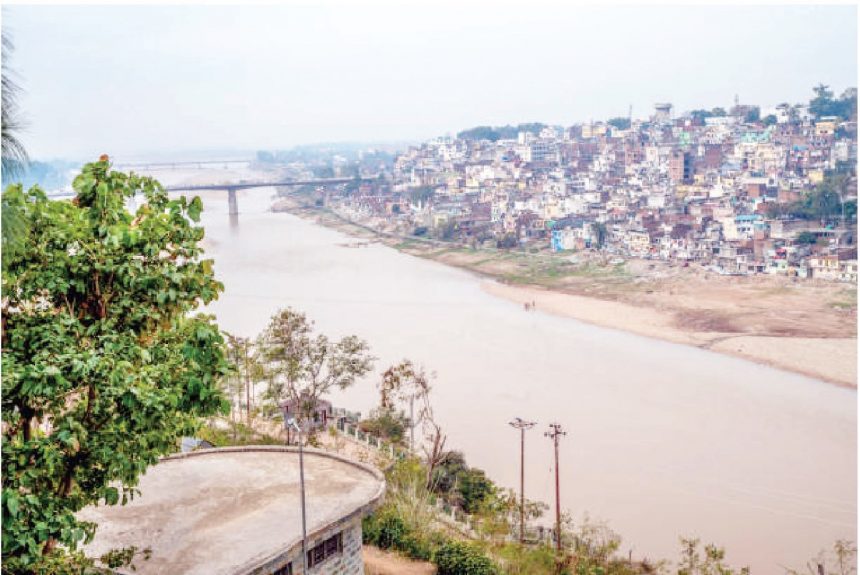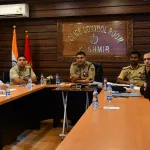JAMMU, May 01: The holy Tawi River, also known as Suryaputri (Daughter of the Sun), holds special religious significance and cultural importance for the people of Jammu.
According to mythology, the Tawi River was brought to Jammu by a local deity, Raja Pehar Devta, to heal his father. The Tawi is mentioned in ancient Hindu texts like the Vishnudharmottara Purana.
Despite facing pollution and declining water levels, the Tawi is still revered and considered one of the most sacred rivers by the people of Jammu.
The Tawi River is deeply intertwined with the religious beliefs and traditions of the people of Jammu and It is a symbol of purity and devotion, and people often perform religious rituals on its banks on occasions like ‘Bachh Dua’, Navratras, holy dip during eclipse etc.
According to local folklore, Raja Pehar Devta, a local deity, brought the Tawi River to Jammu to cure his father’s illness. This story highlights the river’s perceived healing and divine properties.
The Tawi River is mentioned in the Vishnudharmottara Purana, an ancient Hindu text. This inclusion further solidifies its religious significance and historical importance.
The Tawi is often referred to as Surya Putri, signifying its connection to the Sun God. This name adds to its mystical and divine character.
The Tawi River has faced significant challenges in recent years, including pollution from industrial and domestic waste, which has severely impacted its water quality. The river’s water levels have also been declining, threatening the ecosystem and local communities.
Despite these challenges, there are ongoing efforts to revive the Tawi River and restore its natural beauty and ecological balance.
Projects like the Tawi Riverfront development, aim to enhance the river’s aesthetic appeal and create recreational spaces for the local population.
The Tawi River is more than just a water body, it is infact a living symbol of Jammu’s history, culture, and religious significance.
Its journey from a sacred river to facing environmental threats underscores the need for its sustainable management and protection .
The Tawi originates from Kali Kundi glacier in Kaplash mountains of Bhaderwah area of Jammu region.
It is a glacier-fed river, and its water is considered as very auspicious among the Dogra community. Dogras pray at “dabbar”, the deepest point of Tawi.
Jambulochan, the king of Jammu, after seeing goat and lion drinking water together at same place on the bank of River Tawi chose to settle and make it capital.
Bahu Lochan, his younger brother established Qila Bahu. Maa Kali was made as a presiding deity overseeing Tawi.
It is said that Maa Kali was brought from Lahore and is worshipped all the year round. Alongside the Tawi is the Temple of Maha Maya built in the time of Jagmohan the then Governor of J&K that has also become a site of worship and as religious tourist destination.
To its opposite is Peer Kho where there is the Shiva abode in the form of lingam. The legend has it that this is Jamwant cave where he remained in penance for a long time and it is connected through a passage to Srinagar.
This place has also become tourist destination as well as pilgrimage site. A few years back, Har Ki Pouri was set up on the left bank of Tawi where numerous deities searched out of scriptures of Sanatan have been installed.
On right side of Tawi lays a seat of a saint called Mouni Baba, stated to have lived over 154 years.
Further, there is a rare temple where idols of Balram and Revati are installed slightly above the PHE installations along Tawi.
There is a Khoo constructed during old times during the rule of Maharaj Gulab Singh’s royal descendants.
Even now it serves the houses adjoining to this complex. The Dayodi i.e the gate of the temple is very high with sculptor of earlier times.
River Tawi is the lifeline of Jammu city, developed around its banks. Tawi River is also called as Surya Putri in ancient text and is a major tributary of Chenab River and an important river in Jammu region.
It is the same Tawi, which gave Jammu railway station its name- Jammu Tawi.








